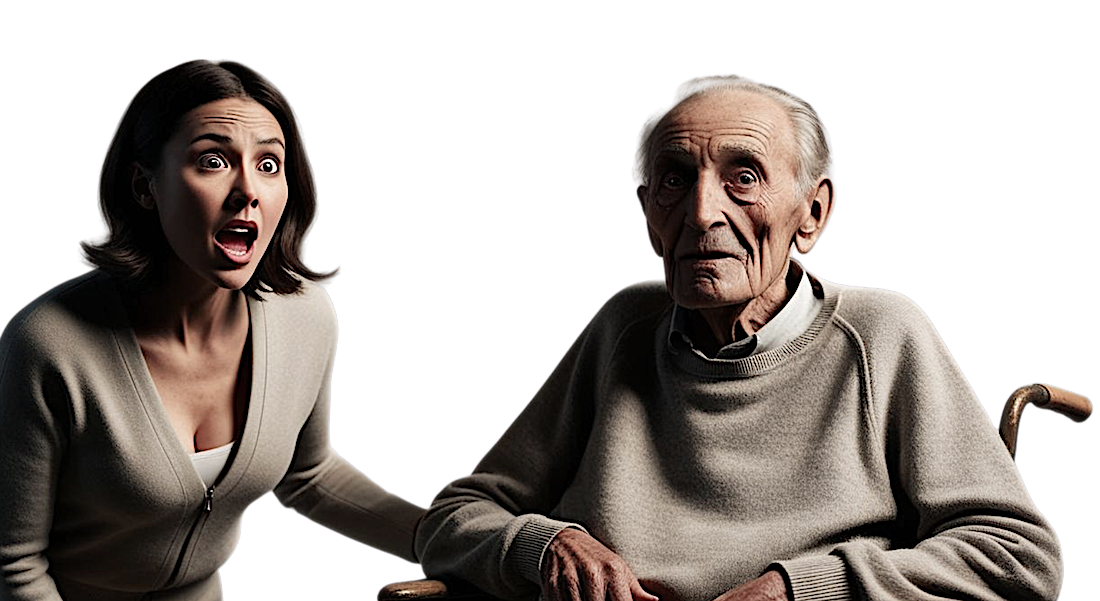Watch the video above or read the original article below.

When They Say and Do Rude or Embarrassing Things
By Anonymous
In his early 80s, my father was diagnosed with dementia.
At first, I was able to care for him part time. However, as his condition worsened, he became about 85% unable to care for himself. This led me to move in with him for much of the last year of his life.
Whether it was because of his age, the multiple medications he was taking, or his dementia, he began to say and do things that could be considered rude or embarrassing, especially when others were around.
For example, he would sometimes touch himself inappropriately or make comments that could be misconstrued, such as remarks suggesting he had engaged in serious misconduct or even crimes such as child molestation or incest.
I had previously read about how the elderly and those with dementia might say or do things that are out of character, including making inappropriate sexual or racist remarks. Still, it was difficult to witness these behaviors firsthand.
One particularly painful moment occurred at the visitation service for my mother after her death. My father was sitting with his niece in the front row of a crowded room when I heard him loudly say something negative about her size. I was embarrassed for her and him, knowing that he would have never said something so rude before his dementia diagnosis.
As his dementia progressed, he seemed to lose his social filters entirely. While I grew more understanding of his condition and learned to overlook behaviors that were far worse, I worried about how others who didn’t understand his illness might react. They might misinterpret him, take offense, or even become angry.
Coping With Social Challenges
Since it was in the days of the COVID-19 pandemic, I encouraged people not to visit him.
Part of the reason for this decision was my genuine concern about the virus, which posed a serious risk to both of us. I didn’t want to see his condition worsen, and as his caregiver, I couldn’t afford to get sick.
However, I also used COVID-19 as an excuse to limit visitors out of fear that they might witness his inappropriate behavior and misjudge him.
Although COVID-19 is no longer available as an easy excuse for isolating our loved ones in such situations, we still might want to limit their time around others if we fear they might say or do embarrassing or rude things. We also might need to plan our excuses or explanations if they do such things. It’s best to be prepared in case they act inappropriately in front of others, such as during necessary trips to their physical therapist, doctor or other healthcare providers.
Although we’ve made significant progress in understanding conditions such as dementia, misunderstandings often continue. Through educating ourselves and others, we can perhaps contribute to a better understanding and compassion for those affected by these challenging illnesses.
For more guidance on handling these difficult situations, visit https://www.agingcare.com/articles/things-people-with-dementia-say-155103.htm
IT MAKES ME WONDER
I wonder what people thought in earlier times when someone was ill and spoke and acted in negative ways, then survived.
Were they ostracized or even accused of crimes based on what they said or did during their illness?
Or did those who heard and saw such words and actions understand that they might not be from the person’s true nature but rather a result of age, medications or dementia?
In the past, before our current knowledge about such illnesses and the side effects of drug treatments, such misunderstandings could have had dire consequences.
Imagine, for example, someone in ancient Rome or England, lying sick in bed and muttering, “The emperor (or king) is crazy. Someone should kill him,” or confessing love to someone’s spouse with, “I’ve always been in love with you. Why did you marry that loser?”
Things could get messy.

